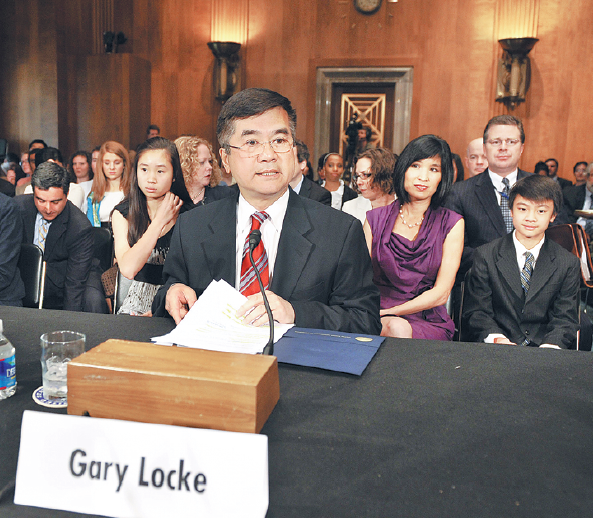
January 1950
EDUCATION:
1972: Bachelor's in political science, Yale University
1975: Law degree, Boston University
CAREER:
1997-2005: Governor of Washington state
2009-11: US secretary of commerce
2011-14: US ambassador to China
2014-present: Adviser and consultant at law firm Davis Wright Tremaine and chairman of Locke Global Strategies, which advises US and Chinese companies on cross-border trade and investment
MEMBERSHIPS:
Member of the Committee of 100, a nonpartisan organization composed of US citizens of Chinese descent who have achieved positions of leadership in a broad range of professions
China-US trade war 'won't solve problems'

Visits and exchanges
How would Locke solve the trade dispute?
"We need to lower the temperature and get back down to direct meaningful sincere negotiations," he said. "I would tell the US side if I were part of the Trump administration that they need to sit down with Chinese leaders, to really focus on the reform and opening-up issues they have: some of the trade policies, whether there are restrictions on investments, ... to some high tariffs on American goods."
Locke said that since Trump is not that supportive of ties and trade with China, the burden now rests on the subnational level: "We have so many governors who understand the values of trade with China. How it actually creates jobs in America, helps benefit the Chinese people."
He said it is up to Democrat and Republican governors to forge greater cooperation and cultural exchanges and understanding with counterparts in China - the Party secretaries and governors of Chinese provinces.
They will be China's future leaders "so we really need to create even stronger bonds of understanding and friendship between leaders at the subnational level", Locke said, adding, "I really think it is important to encourage more visits and exchanges."
He said China is a complex country and people should go there to learn about it firsthand.
"As many Chinese say, Beijing and Shanghai are not all of China," he said. "The modern industry, the skyscrapers of big cities do not represent all of China. China is in many ways a country of contrast.
"When you have almost 40 percent of the population living in the countryside, to really understand China, ... you have to visit and experience both. Certainly, there are huge challenges, social and economic challenges, for the people living in the countryside.
"It also shows the tremendous challenges that the Chinese leadership faces in terms of trying to bring prosperity to all parts of China. And I don't think people from the West really appreciate it."
Locke complimented Chinese leaders on what they have done in terms of the remarkable rise of the middle class and prosperity, even for people in the countryside.
"About 15 years ago, only about 5 percent of the people living in the cities were middle class. Now it's close to 65 percent middle class," he said. "So that's a remarkable achievement that China has demonstrated to the world."


